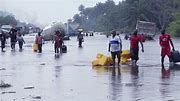BRUSSELS—Behind the polished facade of diplomatic jargon, a subtle dance is taking place within NATO. In an effort to navigate the turbulent waters of global politics, the alliance is recalibrating its language on critical issues like climate change, gender equality, and diversity.
According to insiders familiar with the situation, this strategic move is a response to concerns about potential backlash from the Trump administration. As Donald Trump’s second term unfolds, NATO finds itself treading carefully to avoid provoking any adverse reactions from Washington.
The delicate process involves revising phrases related to climate action, women’s empowerment, and diversity in new NATO legislation. These amendments are crafted by committees and working groups within the alliance with an eye toward crafting language that will be palatable to American sensibilities.
“Green technologies” have reportedly been substituted with “innovative technologies,” while the term “climate” has been recast as an “operational environment,” shedding light on the subtle nuances being employed in these linguistic maneuvers.
In a climate where initiatives promoting diversity, equity, and inclusion are facing headwinds in the U.S., officials within NATO find themselves walking a tightrope. As one insider candidly put it: “
Everyone sees on the news where the Trump admin stands; you don’t want to do anything that shoots yourself in the foot.
”
The reluctance to directly address issues like “
gender” or
“women, peace and security”
reflects a pragmatic approach aimed at garnering support from all 32 member countries—including the United States. It underscores how political realities can shape even seemingly apolitical aspects of international organizations.
Within this intricate web of diplomatic maneuvering lies a deeper truth—that discussions around climate change and diversity are not just moral imperatives but also strategic necessities for military alliances like NATO. The intersection of environmental challenges with national security imperatives is increasingly recognized as vital in modern warfare scenarios.
As one official emphasized: “Everyone knows that presenting it as a diversity issue may backfire. It’s not about being ‘woke’; it’s about integrating these considerations into military strategies for greater effectiveness.”
Amidst these nuanced debates over language lies a broader geopolitical context where calls for increased defense spending reverberate across Europe and beyond. President Trump’s demands for higher financial contributions from NATO members have added another layer of complexity to an already intricate tapestry of international relations.
The push for Europe to shoulder more of its defense burden has implications far beyond mere financial calculations—it strikes at the heart of transatlantic solidarity and mutual security guarantees that underpin organizations like NATO.
Against this backdrop, questions loom large about how best to balance fiscal responsibilities with collective defense commitments. The recent proposal by the Trump administration to slash funding for international organizations underscores these challenges faced by multilateral institutions like NATO.
In navigating these choppy waters, NATO remains steadfast in its commitment to preserving unity among member states while adapting pragmatically to evolving political landscapes. As events unfold on both sides of the Atlantic, one thing remains clear—the delicate art of diplomacy requires finesse and flexibility in equal measure.









Leave feedback about this